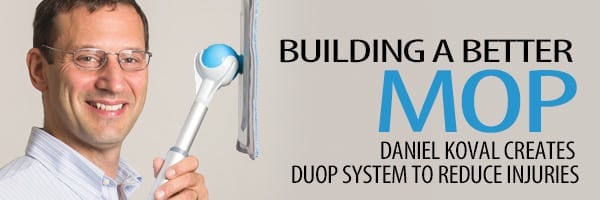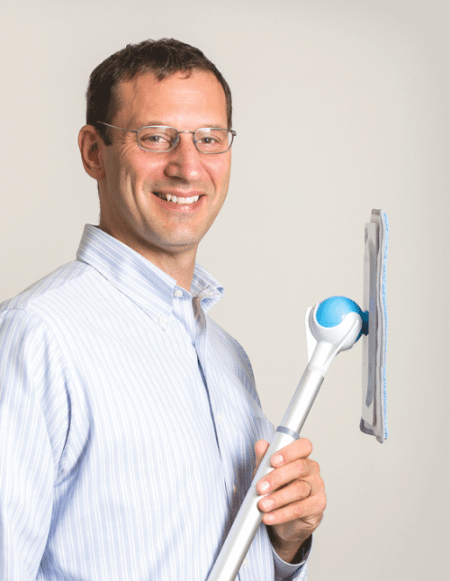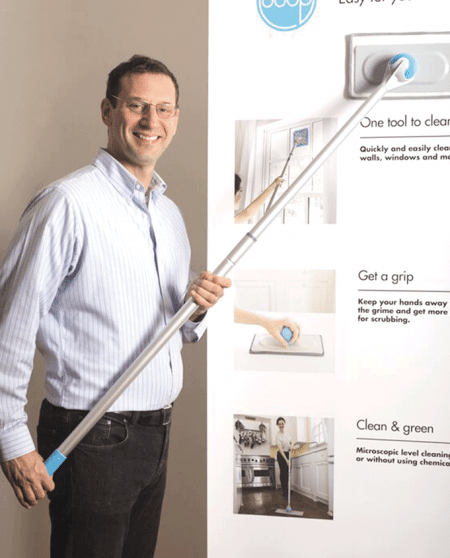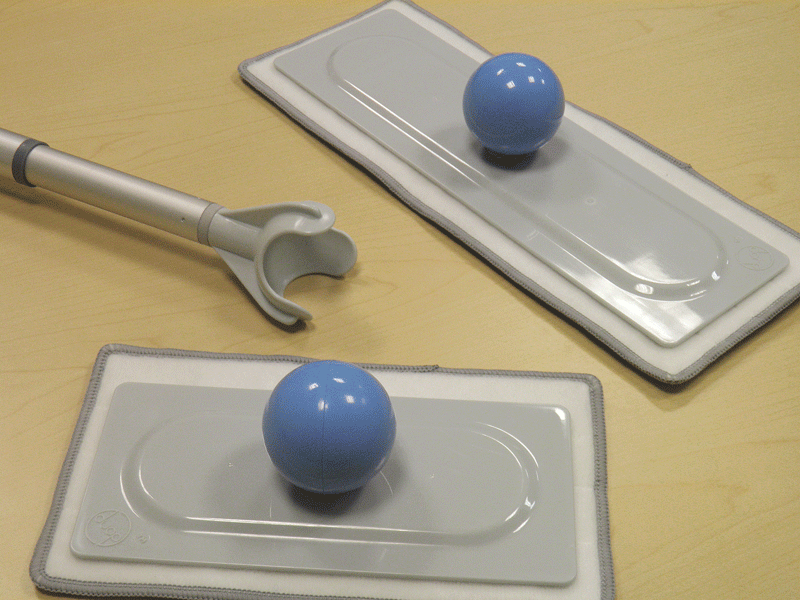
Daniel Koval Creates Duop System to Reduce Cleaning Injuries
Building a Better Mop

Dan Koval
Dan Koval found inspiration for his latest entrepreneurial venture while sitting in a hotel room, watching a cleaning attendant struggle with back pain. A conversation with that woman led to a question: what solutions exist to reduce such chronic pain — and the employer costs related to worker injury and lost time? Finding none, Koval — the latest subject of BusinessWest’s ongoing series of articles about the region’s growing wave of entrepreneurs — decided to come up with one of his own.
Four years ago, Daniel Koval was working in a London hotel room when the cleaning attendant arrived. Although most people leave while the job is being done, he stayed and continued to work.
“But I could tell that the woman’s back was hurting from the way she was moving,” Koval recalled, adding that it led to a conversation he found profoundly intriguing.
“She told me she had just returned to work after taking nine months off for a back injury incurred on the job,” he said. “When I pushed, she told me the hotel group had paid $40,000 for her surgery, the insurance company had offered her more against further claims, and all of her colleagues had either been injured on the job or were out with similar work-related injuries.”
Koval had spent the majority of his career in product development, and the room attendant’s story presented a challenge he couldn’t forget. “I realized everyone was losing — the woman would suffer back pain the rest of her life, and, in addition to costing the company money, they lost a good employee for nine months. There are other costs associated with hiring a replacement, so, I thought, ‘why not try to crack this?’”
At the time, the serial entrepreneur was running another business, so the idea was relegated to the back burner. But it simmered until it got his full attention and he took steps to determine the scope of the problem.
Koval had a team of product designers and ergonomists visit hotels in London and in the U.S., where they met with union representatives and discussed the incidence of job-related injuries. “We quickly found it was a global problem,” he said.
“Room attendants are the coal miners of the hospitality industry. Their work is taxing and physically demanding; they have to kneel, bend, and put their wrist in positions that can cause carpal-tunnel problems, and they do this eight hours a day, five or six days a week. It can affect their knees, shoulders, wrists, and back,” he explained. “One study found that 91% of room attendants experience pain at work, and 66% take pain medication just to be able to go to work.”
The next step — which eventually led Koval to leave Europe, move back to the U.S., and start a new business called Worksafe Technology Inc., whose first product is a mop system designed to solve the problem — was to have experts shadow room attendants. However, they also looked at other industries and found that window washers and people who cleaned hospitals, restaurants, office buildings, and homes that provide temporary or long-term care had similar issues with their necks and shoulders.
“We looked at the tools they were using, studied what was wrong, and decided to focus on creating a new mop. Traditional mops are designed to clean floors, but there was no tool that could clean the back of tub walls, baseboards, windows, and mirrors — in other words, both vertical and horizontal surfaces,” Koval told BusinessWest as he demonstrated repetitive body positions required to clean these surfaces in a small space, which include kneeling, squatting, and balling up a rag and repeatedly rubbing it with a bent wrist to clean a mirror. “The problem with traditional mops was the hinge, and they all used the same system.”
At that point, the concept for the Duop system was born.
What’s a Duop?
The name comes from the idea of having a ‘dual mop,’ as the head of the product can be removed and used by hand, which leads to better ergonomic, hygiene, and cleaning results, Koval said.
However, the Duop took time to develop, and many adjustments were made based on feedback culled from London hotel-room attendants who tested a variety of prototypes. Changes were incorporated that included the size of the handle grip and the ability to move it easily from room to room, which Koval said is important, as many upscale hotels are doing away with unsightly cleaning carts, instead having room attendants carry the supplies they need.
“It took five to seven rounds before we got something that worked. But we kept fine-tuning the product with advice from our ergonomists,” he noted.
Today, the mop has been perfected. It employs a telescopic pole that can be adjusted and locked into a three- to five-foot length, depending on the job that needs to be done. “Most mop handles are four feet, but having one that is five feet allows the person to stand up much straighter. Plus, it can be extended to clean the ceiling,” Koval told BusinessWest.
However, the revolutionary part of the tool is found at the end of the pole. It contains a unique ball-and-socket mechanism that can pivot 360 degrees when the ball on the head is snapped into the socket, which allows it to be used for a variety of tasks, such as cleaning shower walls and ceilings or dusting baseboards.
The heads come in three sizes, and a variety of microfiber cloths — one designed for dusting, another for scrubbing, and a third for general mopping — can be attached to them with Velcro, although one type of head allows a cloth to be folded into its edges, then flipped over and reused.
“The room attendants’ biggest considerations were speed and quality of cleaning. What we gave them had to allow them to clean faster and better because they are under such pressure to meet their quotas,” Koval said.
Those goals have been realized, he went on. “Using the wide face to clean a mirror instead of a crumpled cloth allows the job to be done five times faster and is more hygienic, as the microfiber picks up microscopic particles.”
Koval and his associates were surprised by the response to the prototypes. “They told us they wanted to keep them and use them at home. It made us realize the Duop is not just a commercial product, but something that can help the consumer clean easier and faster.”

Dan Koval says the Duop mop is the first of what he hopes are many products his company develops to help reduce injuries and promote workplace wellness.
In 2012, Koval created a company known as Worksafe Technology Inc. to market the Duop System. Its goal is to eliminate causes of frequent and recurring workplace injuries by combining expertise in product design, development, and technology.
“We are just rolling the Duop out on the market,” he said, explaining that it took so long partly because he worked on it only part-time. “Our patent was filed about a year ago and is still pending, but we brought the mop to commercial trade shows for professional cleaners, industry shows for housekeepers, and the Chicago Housewares Show, and the response has been amazing.”
Large, professional cleaning organizations have expressed interest, and at the consumer show, companies ranging from QVC to Bed Bath & Beyond and Amazon shared their enthusiasm. “There was also interest by international companies, and we are negotiating an agreement with partners in Japan, Taiwan, Holland, Germany, and the U.S.,” Koval said. “The product was just launched in the past month, and so far, we have sales of more than $100,000 pending.”
The cost of the mop will range from $25 to $40, and getting to that figure was critical, as Koval said ergonomic products are often priced too high to compete with standard products. “But our goal is to help as many people as we can.”
The mops will be marketed to the general public via Worksafe Technology’s website in about two months. “We have developed e-commerce packaging, but still have to develop consumer packaging, and that requires being able to explain what the mop does in about three seconds,” he noted. “But I’m very excited about this. It’s rare to come up with something so simple that has the potential to help so many people.”
All-encompassing Experience
Koval began his career with a degree in marketing. “But I always wanted to be in product development. It excites me,” he said. Although he grew up in Western Mass., after graduating from college he was hired by GE, who sent him to London, then Hungary. He worked in sales and international business development, then as a product manager for GE Lighting.
After earning an MBA from INSEAD in France and working as a consultant, he knew it was time to branch out on his own, and he established a gift company called Heads Up Design that manufactured cuckoo clocks featuring farm animals. He sold that business to a German company, but continued to develop items that ranged from clocks to candles. “We made about 30 different products,” he said.
Koval was living in Budapest when he began conducting the research required to create the Duop mop. When he moved back to the U.S. in 2012, his gift business became secondary, as he felt the potential for the Duop was unlimited and the need for it was greater here than in Europe.
“The U.S. doesn’t have socialized medicine, so our initial belief was the cost of an injured employee was higher to insurance companies and businesses here. But we are finding there is a huge demand for the mop in Europe. It turns out that it’s not only the cost of healthcare, it’s about the cost of losing a good employee, which makes it universal,” he told BusinessWest. “And consumers want anything that will help them clean faster and better. The drudgery of cleaning is the same everywhere in the world.”
Although Koval returned to Western Mass. to establish Worksafe Technology, he thought he would have to relocate again to a larger city like Boston to stay competitive. But he is happy to report he and his family will be able to remain in the Berkshires, thanks to his involvement with Valley Venture Mentors (VVM), an entrepreneurship-mentoring program based in Springfield.
“I had moved to Europe in 1989 and spent almost my entire career there, so I didn’t have any business contacts here,” Koval said. “But I heard that VVM was organizing a bus trip to Boston, and after I met some of the members and got involved, I realized there was an entrepreneurial ecosystem right here in Western Mass.” He added that VVM has been extremely helpful, and co-founder Paul Silva introduced him to the company that will become his partner in the U.S. market.
The Duop system is Worksafe Technology’s first product, but the company will continue to seek ways to reduce injuries in the workplace. “Now that we know what to look for and how to design these products, we will to try to solve other healthcare-related problems,” Koval continued.
No Pain, but Gain
The inspiration for the Duop system came from watching a woman work despite obvious discomfort. But Koval said the pain the mop can prevent is both literal and figurative.
As to the figurative, well, that enters the picture in terms of healthcare expenses and the cost of replacing and training new employees, even if it’s on a temporary basis. “In 2010, workers’ compensation programs cost employers $71.3 billion, and the cost of an average injury is estimated at over $20,000, so the benefits of eliminating them is immense,” Koval said.
But the reward for preventing pain — the ability to work in an occupation known for repetitive stress injuries without fear of incurring one — is priceless, and affects the physical, mental, emotional, and financial realms.
And he has already seen the effects. “I got a big hug when I gave one woman our mop. She had been a housekeeper for 20 years and was so happy with it,” he recalled. “Another said, ‘it’s too late for me because I already have an injury. But this could really help young people from getting hurt on the job.’”
Which is exactly what Koval anticipates the Duop will do.
“It’s great from a design aesthetic,” he said, “but I hope it will bring a smile to people’s faces who work in the cleaning industry, and also cause businesses to smile for a different reason — no more painful costs.”







